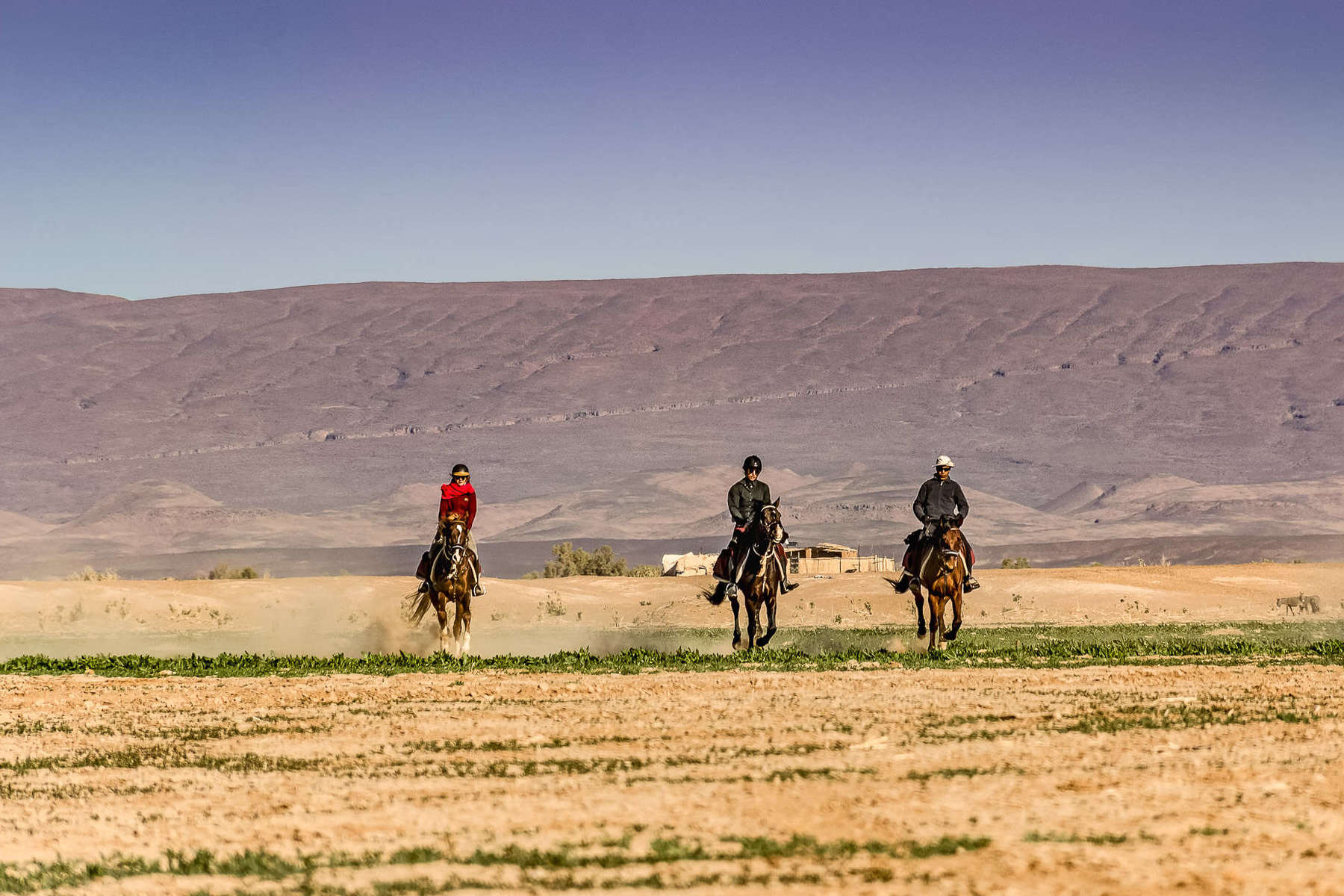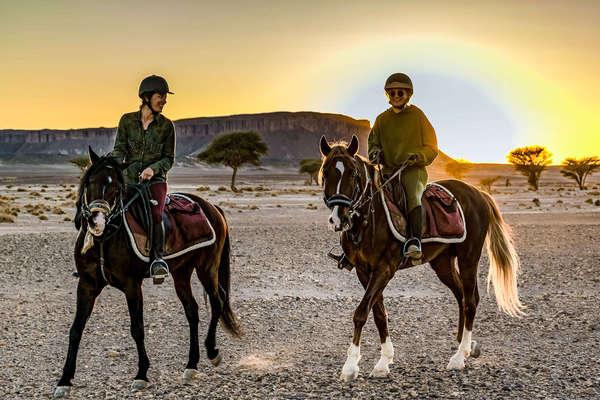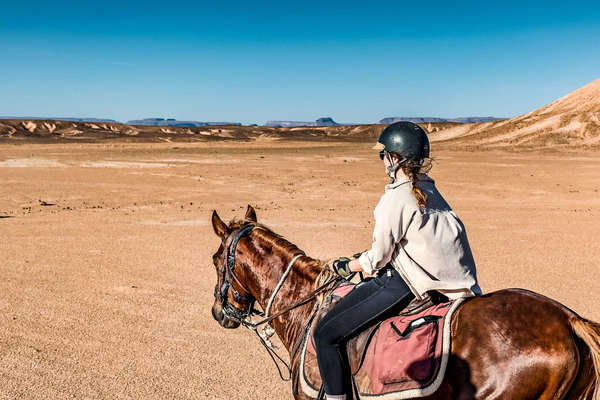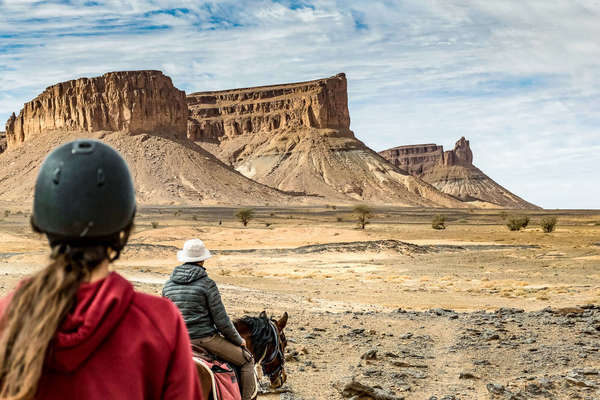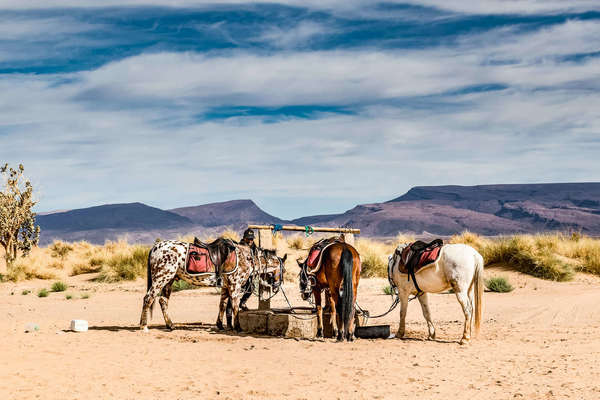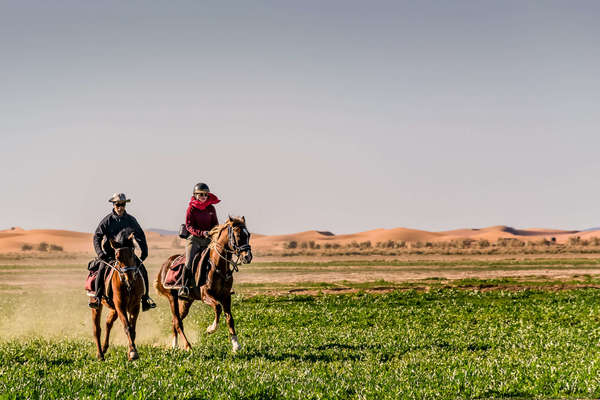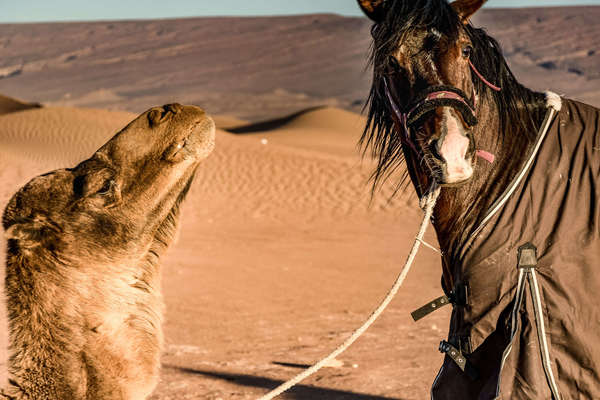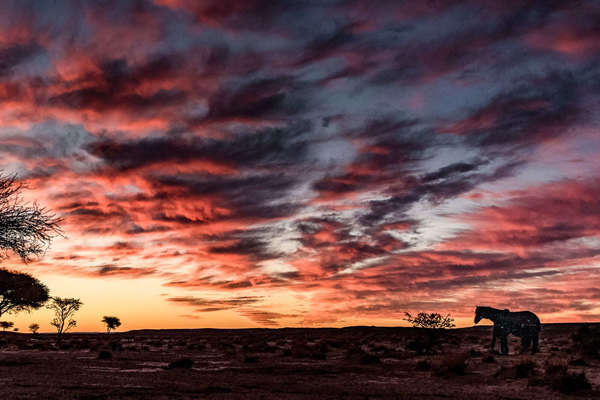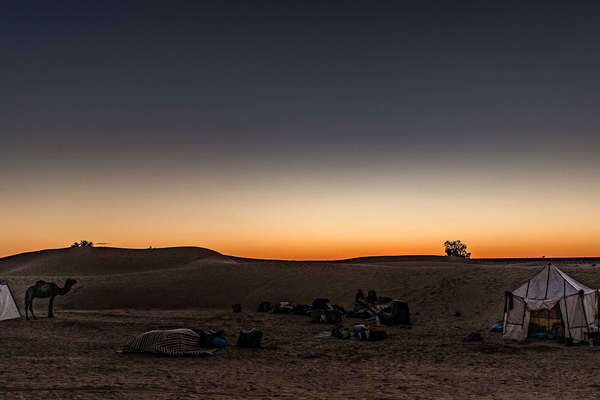Comfort
This is a camping trip: two-man tents with thick foam mattresses, a mess tent for dinners, and a shower/toilet tent with heated water.
Sleeping bags are not provided and you must bring your own. Nights in the desert can be cold, especially in December and January.
Meals
All meals are cooked by your camp chef. They are hearty and generous in quantities, all inspired by the traditional Moroccan cuisine – salads, tajines, couscous, breads, etc.
Water is provided but you need to bring your own water bottle.
Special diets can be accommodated, however please note that some foods can be difficult to find in Morocco. Certain diets may incur a supplement (gluten-free diets can be accommodated at a supplementary charge of €100/£90/$110 for instance, if you require specific gluten-free supplements). All dietary requirements must be specified at the time of booking.
Climate
In southern Morocco the rains are rare but not non-existent and in recent years the Sahara has experienced substantial rainfall. In the Spring and Autumn months the temperatures are pleasantly warm. In October and April the temperatures can be 35c during the day, dropping to 20c at night whilst in November, February and March it is a little cooler (25c daytime and 12c night). In the heart of the winter (December/January) the mornings and evenings can be cold, as low as minus 5c. At midday the temperatures will be 18-20c can drop rapidly once the sun sets. In summer it is too hot to ride (45c) and so no desert trails run in the summer.
Tips
It is customary, as a sign of thanks to tip the local team. We recommend a tip of €50/£45, but you should give what you feel comfortable with. We recommend giving the tips to your guide who can distribute them amongst all of the staff members.
Packing list
IMPORTANT: Please don't take a hard sided suitcase. Your luggage should be soft sided and you should pack it into two bags if it weighs more than 15-20kg so it's easier for the team to transport between camps
Head
- Equus Journeys strongly recommend that you wear a riding helmet and that you take your own to ensure a correct fit.
- Sunhat for when not riding
- Sunglasses - with a cord attached so they don't fly off when riding
- Buff or bandana
Upper body
- Long sleeved shirts provide protection from the sun and dust
- T-shirts
- Fleece, jumper or jacket - the evenings can be cold
- Waterproof jacket - the rains can be difficult to foresee and it's better to be prepared. Layering is key to cope with the fluctuations in temperature between day and night
- Casual clothes for the evening
Legs
- Lightweight, comfortable riding trousers or jodhpurs - we recommend riding in them at home before taking them on holiday to ensure they don't rub
- Shorts for lazy lunchtimes
- Casual clothes for the evening
- Swimsuit
Hands and Feet
- Comfortable riding boots. We recommend short boots with half chaps as long chaps/long boots can get very hot.
- Sandals, flip-flops or trainers for moving around the camp
- Gloves - your hands are particularly exposed to the sun whilst riding
Nightwear
- Thermals are a good option for sleeping in, or a t-shirt and shorts for warmer nights
- A woolly hat when camping (nights can be cold)
- Sleeping bag - we recommend a comfort factor of 0°C/-5°C. We also recommend taking a silk or fleece liner for an extra layer
Other useful items
- Towel. Camping towels will pack lighter and dry more easily
- Sarong (for going to/from the shower tent)
- Water bottle (1.5 litre or two x 1 litre)
- Hand sanitiser
- Wet wipes for when showers aren't possible
- Camera and high capacity memory card. Spare battery
- Bumbag for carrying your camera and small items whilst riding
- Headtorch or small torch for moving around camp at night
- Toilet paper and small plastic bags for taking rubbish away
In your luggage
- Any liquids, such as shampoo, moisturiser, deodorant unless they are less than 100ml and all bottles can fit in a small, clear, plastic ziplock bag.
- Small penknife
In your hand luggage
- Any valuables, such as your camera, ipod, ipad etc.
- Your riding hat
Medical kit
- Sunscreen and lip balm - must be high factor
- Insect repellent
- Any medication you regularly take
- Blister plasters in case of any rubs
- Antiseptic cream, plasters, aspirin, anti-histamine, insect-bite salve etc...
- Rehydration sachets (dioralyte or similar)
- Spare prescription glasses/contact lenses
- Ear plugs, particularly if you are a light sleeper
- Micropur or similar water purification tablets
Our Recommendations
- Please don't take a hard sided suitcase. Your luggage should be soft sided and you should pack it into two bags if it weighs more than 15-20kg so it's easier for the team to transport between camps
- Take a second, smaller bag to pack things you may need during the day such as a book or suncream then you can easily access it during the long lunch break. You are not allowed to ride with your backpack but saddlebags are provided.
- We recommend travelling in your riding boots and carrying your hat and some riding clothes in your hand luggage - then if your luggage goes astray you are still able to ride!

